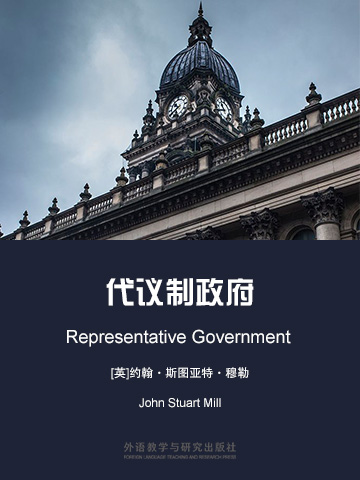代议制政府究竟是优是劣?读过之后自有定论。
《代议制政府》发表于1861年,是西方学者公认为有关议会民主制的一部经典著作,对英国以及欧美各国的政治制度有较大影响。该书的特点不在于论述政治理论的抽象原则,而在于论证了有关代议制政府的各种问题,这给该书以重要意义。
Considerations on Representative Government is a book by John Stuart Mill published in 1861. As the title suggests, it is an argument for representative government, the ideal form of government in Mill's opinion. One of the more notable ideas Mill puts forth in the book is that the business of government representatives is not to make legislation. Instead Mill suggests that representative bodies such as parliaments and senates are best suited to be places of public debate on the various opinions held by the population and to act as watchdogs of the professionals who create and administer laws and policy.
- Preface
- Chapter I To What Extent Forms of Government are a Matter of Choice.
- Chapter II The Criterion of a Good Form of Government.
- Chapter III That the ideally best Form of Government is Representative Government.
- Chapter IV Under what Social Conditions Representative Government is Inapplicable.
- Chapter V Of the Proper Functions of Representative Bodies.
- Chapter VI Of the Infirmities and Dangers to which Representative Government is Liable.
- Chapter VII Of True and False Democracy; Representation of All, and Representation of the Majority only.
- Chapter VIII Of the Extension of the Suffrage.
- Chapter IX Should there be Two Stages of Election?
- Chapter X Of the Mode of Voting.
- Chapter XI Of the Duration of Parliaments.
- Chapter XII Ought Pledges to be Required from Members of Parliament?
- Chapter XIII Of a Second Chamber.
- Chapter XIV Of the Executive in a Representative Government.
- Chapter XV Of Local Representative Bodies.
- Chapter XVI Of Nationality, as connected with Representative Government.
- Chapter XVII Of Federal Representative Governments.
- Chapter XVIII Of the Government of Dependencies by a Free State.
- 书评 写书评
- 笔记
-
书评加载中...





















 京公网安备 11010802032529号
京公网安备 11010802032529号
笔记加载中...